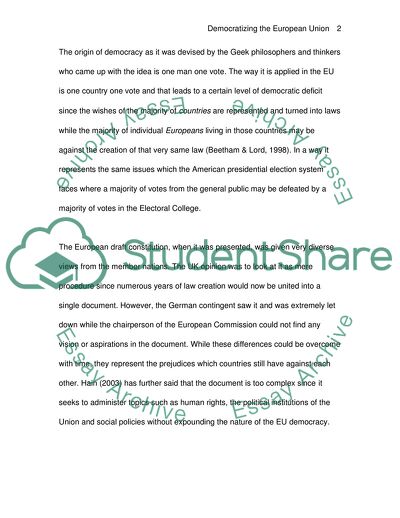
- Home
- Free Samples
- Premium Essays
- Editing Services
- Extra Tools
- Essay Writing Help
- About Us
- Studentshare
- Subjects
- Miscellaneous
- Democratizing the European Union
Democratizing the European Union - Essay Example

- Subject: Miscellaneous
- Type: Essay
- Level: Ph.D.
- Pages: 4 (1000 words)
- Downloads: 0
- Author: sven75
Extract of sample "Democratizing the European Union"
The primary basis for the last accusation is the way in which the creation process of laws in the EU operates. At the root of the matter, each nation has a singular vote with which to concur with or disagree with a law and the votes are taken equally not considering of the size of the populace or the financial strength of the nation. While this may seem like a democratic procedure, what it does in reality is that it equates majorities with minorities. In the worse case scenario, it can even give a small minority power over the majority.
The origin of democracy as it was devised by the Geek philosophers and thinkers who came up with the idea is one man one vote. The way it is applied in the EU is one country one vote and that leads to a certain level of democratic deficit since the wishes of the majority of countries are represented and turned into laws while the majority of individual Europeans living in those countries may be against the creation of that very same law (Beetham & Lord, 1998). In a way it represents the same issues which the American presidential election system faces where a majority of votes from the general public may be defeated by a majority of votes in the Electoral College.
The European draft constitution, when it was presented, was given very diverse views from the member nations. The UK opinion was to look at it as mere procedure since numerous years of law creation would now be united into a single document. However, the German contingent saw it and was extremely let down while the chairperson of the European Commission could not find any vision or aspirations in the document. While these differences could be overcome with time, they represent the prejudices which countries still have against each other.
Hain (2003) has further said that the document is too complex since it seeks to administer topics such as human rights, the political institutions of the Union and social policies without
...Download file to see next pages Read More
- TERMS & CONDITIONS
- PRIVACY POLICY
- COOKIES POLICY